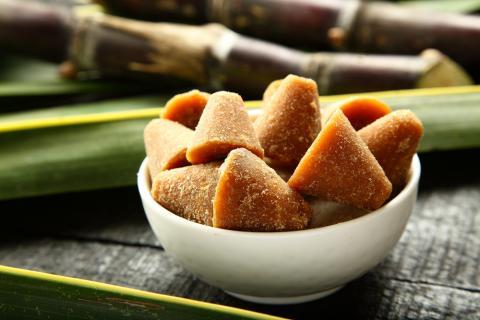
Sugar has now become public enemy number one, and salt is vying for second place as well, what with diabetes, cholesterol, and blood pressure issues becoming the norm rather than rarity. So what is one to do when craving that after-meal sugar fix, or just wanting to make that bitter coffee a tad more palatable? Jaggery might just be the holy grail of all that is sweet, and it comes with a few additional health benefits too…
What is jaggery?
Sugar, as we all know, is made from the juice or the sap of sugarcane, coconut palm, or date palm—but primarily, sugar is derived from sugarcane for convenience as well as cost. Jaggery (known as gur in Hindi) is made a few steps before sugar though—by boiling raw sugarcane juice till in time it concentrates into a thick goo that solidifies as it cools. Fresh jaggery is soft to touch, with the consistency of Play-Doh, while jaggery that has seen a few days go by is harder and needs to be broken or sliced off with a knife. Powdered jaggery (called shakkar in Hindi) is another option.
Sugar is made by running this thick goo through a centrifugal processor that spins it at a high speed, separating the molasses from the sugar. Since jaggery retains the molasses, it has a better nutritional profile than sugar, but it is also slightly higher in calories.
What does that mean when it comes to nutrition?
100gm of sugar is almost 100% empty calories, some 387 in total—pure sucrose, with no added nutrition otherwise. 100gm of jaggery is another matter altogether: the total calorific value stands at about 370-390 (depending on the source and distillation process) out of which sucrose is about 65-85gm and fructose and glucose together stand at 10-15gm. So primarily, jaggery is all about sugar too. That said, it does contain about 0.4gm protein, 0.1gm fat, 11mg iron (60% of RDI), 70-90mg magnesium (20% of RDI), 1050mg potassium (30% of RDI) and 0.2-0.5mg manganese (10-20% of RDI); as well as small to trace amounts of B vitamins and minerals, including calcium, zinc, phosphorus and copper.
Calorically speaking, jaggery is slightly higher than sugar but it does have more nutrition than what sugar has to offer. So does that mean that we add jaggery to our diet? Not really, for adding artificial sugar is basically always a bad idea. A better idea is to replace all the artificial sugar you use—in your beverages, baking, desserts, etc.
The Ayurvedic Benefits of Jaggery
Medicinal science does not attribute many benefits to jaggery, simply because nutritionally speaking, it is ultimately an artificial sugar. Jaggery is not something you have to eat, nor should you eat it in large amounts because its high sucrose value will only make you gain weight. That said, Ayurveda follows a different science and according to it, jaggery has many vata-balancing and kapha-balancing properties but is best avoided for those with pitta dosha as it increases pitta or the heating element of the body.
- To rid yourself of constipation, decrease acidity, and otherwise have a healthy digestion, finish off lunch or dinner with a small 2cm piece of jaggery.
- To alleviate the symptoms of common cold, you can add jaggery to sweetened ginger tea and let the pitta-rich jaggery work to clean the sinuses and ease the congestion.
- To ease a sore throat, steep basil leaves in water and sweeten it with jaggery—you can squeeze in half a lemon for some vitamin C as well.
- For women with irritating PMS, period cramps, or pain, all you need to do to is drink a glass of milk sweetened with a teaspoon of jaggery 3-4 days, consecutively till the onset of your period.
- For heavy period cramps, grandma had a remedy that was as yummy as it was effective: Heat ghee (clarified butter) and drop in a half teaspoon carom seeds. Add in 1-2 teaspoons of jaggery powder or a 3-4cm piece of jaggery. Wait for the jaggery to turn into bubbly goo and transfer the same to a bowl. Dip in with a spoon and enjoy the treat.
- Jaggery can also help flush out excess water for those having water retention or bloating. Boil a cup of water with 2 teaspoons jaggery and fennel seeds each. Let the liquid boil and simmer to half the quantity. Drinking this at night can flush the system a tad.








